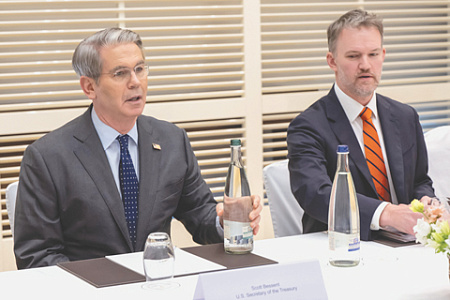
On Sunday, May 11, negotiations between the United States and China on resolving tensions amid the introduction of mutual customs duties resumed in Geneva, Reuters reported. On the American side, Secretary of the Treasury Scott Bessent and Trade Representative Jamison Greer are taking part in them. The Chinese delegation is headed by Vice Premier of the State Council of the People’s Republic of China He Lifeng, who is responsible for the financial and economic block in the government.
The first talks between high-ranking officials of the two countries since the beginning of the hot phase of the Sino-American trade war are shrouded in secrecy. The venue in Geneva has not been officially announced. According to the AP news agency, the meeting is taking place in the 18th-century Villa Saladin mansion overlooking Lake Geneva. Neither side commented on the 10-hour contacts on Saturday. However, in an interview before the start of the negotiations, Bessent said that one should not expect the signing of the agreement in Geneva. According to him, it is more likely to be about reaching an understanding on the issues that need to be discussed, since a rapprochement of positions is in the interests of both the United States and China.
However, American President Donald Trump was quick to praise the meeting. “I had a very good meeting with China in Switzerland today. We discussed a lot, agreed on a lot. A complete reboot, agreed upon in a friendly but constructive manner,” he said in a message on the TruthSocial social network. Trump stressed that he wants to see how the agreements reached will work for the benefit of the United States and China. Earlier, Trump has repeatedly stated that he does not intend to reduce tariffs without concessions from China. However, on May 9, he said that the 80% duty “looks reasonable.”
Relations between Washington and Beijing have sharply worsened after Trump imposed 145 percent duties on imports from China. As a result, the cumulative US duties on some Chinese goods reach 245%.
China has imposed retaliatory duties of 125% on American goods. All this actually means the establishment of a trade embargo between the two countries, according to the British The Guardian.
The trade dispute with China, combined with Trump’s decision in April to impose tariffs on most countries, has already disrupted supply chains, destabilized financial markets, and increased concerns about the global economic downturn. According to estimates by the World Trade Organization (WTO), the division of the global economy into competing blocs could lead to a reduction in global GDP of almost 7%. It is not surprising that WTO President Ngozi Okonjo-Iweala welcomed the negotiations between the United States and China, calling them a step towards de-escalation.
“The Sino-American talks in Geneva are of great interest in Beijing. On the eve of the meeting, the Customs Administration of the People’s Republic of China published data on foreign trade for April. It is clear from them that, although Chinese exports remain relatively stable so far, having increased by 8.1% separately in April, the increased duties have already dealt a severe blow to the supply of Chinese goods to the American market. Direct exports to the United States fell by 21.1% in April, decreasing by $8.8 billion compared to April 2024,” said Sergey Tsyplakov, professor at the Higher School of Economics and a leading researcher at the Institute of China and Modern Asia of the Russian Academy of Sciences.
The Chinese Ministry of Commerce said in a statement that the negotiations were initiated by the American side, which “through many channels signaled to the Chinese side that it was desirable to start discussing the issue of duties.” On May 10, the day of the start of the meeting in Geneva, the People’s Daily published an editorial entitled “Equal dialogue is the right way to solve problems between big Powers.”
It emphasized China’s role as a responsible world power, and noted that by agreeing to hold contacts with the American side in Geneva, China proceeded from considerations of the need to “maintain the stability of the global economy and protect the common interests of the world community.” The Chinese position was repeated that “dialogue is better than confrontation,” but at the same time, the emphasis was placed on the fact that “negotiations are by no means identical to unilateral concessions.”
According to Tsyplakov, China has once again made it clear that the dialogue should be of an equal nature. The Chinese side intends to determine its attitude to negotiations with the United States depending on the degree of honesty of the American partners, guided by the statement of Confucius in the treatise of Lunyu: “Listen to their speeches, but watch their actions.”
At the same time, China assumes that, given the complexity of the issues, negotiations can be lengthy. In this regard, the People’s Daily notes that “negotiations are necessary to mitigate and overcome differences, but it would be unrealistic to hope that problems can be resolved once or twice.”
In general, according to the expert, the situation around the Sino-American talks, despite Trump’s optimistic statements, remains highly uncertain. It cannot be ruled out that the United States may reduce tariffs somewhat as a “goodwill gesture” to encourage China to step up negotiations.
However, the reduction of tariffs to 80%, as discussed in Washington, is unlikely to satisfy Beijing. In the current situation, it should be assumed that before the beginning of July (the expiration of Trump’s 90-day pause in the application of “mirror duties”), when it may become clear whether the American administration will be able, and if so, on what terms, to negotiate with the main trade and economic partners, special progress on the Sino-American negotiating track It won’t be. Although the negotiations themselves are likely to continue in one form or another, Tsyplakov believes.
